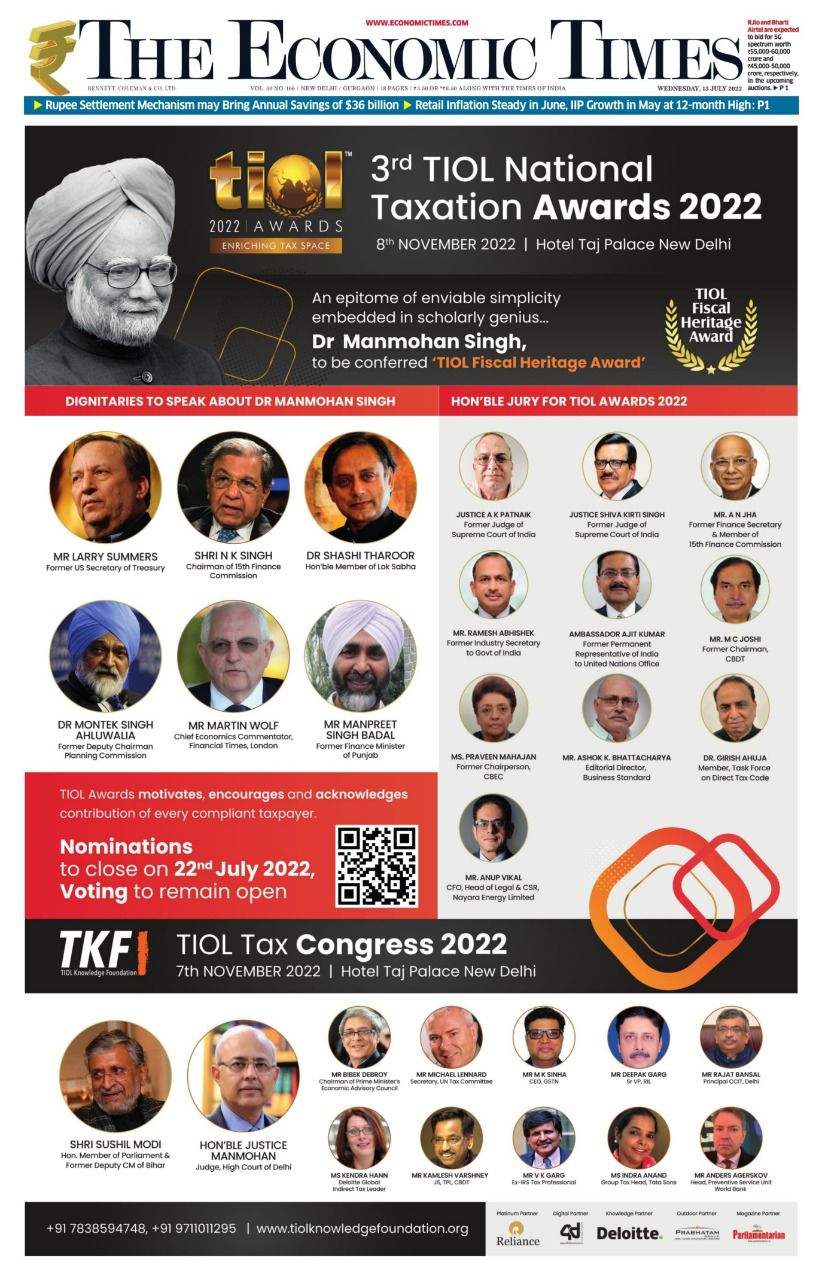2022-TIOL-604-CESTAT-MUM
CC Vs Reliance Jio Infocomm Ltd
Cus - Issue arises for consideration is, whether the goods imported by assessee merit classification under Tariff Item 8517 62 70 of Customs Tariff Act, 1975 as contended by Department or under Tariff Item 8517 70 10 ibid as claimed by importer -assessee - Assessee have imported various "CARDS" (Populated Printed Circuit Boards) for DWDM equipment- Photonic Service Switch (PSS) 1830 - Department could not support their contention - No technical literature was submitted; in spite of the fact that the imports have been taking place over a period of time - In one instance Revenue has accepted the order of Commissioner (Appeals) - Department has not drawn any samples and did not obtain technical opinion to support their claim that the impugned goods are complete machines or equipment capable of independent function themselves so as to merit classification underTariff Item 8517 62 70 ibid - On the contrary, assessee could demonstrate by technical literature; samples and the ratio of judgments that the goods imported by them are Populated Circuit Boards (PCBs) used in PSS 1830 and therefore, the impugned goods are parts of PSS and as such merit classification under Tariff Item 8517 70 10 ibid - Appellants have submitted US Customs Rulings on classification of impugned goods, though they are not binding on Tribunal, they would certainly have a persuasive effect more so in the absence of any evidence to the contrary - There is no merit in the appeals filed by Department - Impugned orders upheld: CESTAT
- Appeals rejected: MUMBAI CESTAT
2022-TIOL-603-CESTAT-DEL
Mauli Worldwide Logistics Vs CC
Cus - Appellant is aggrieved by impugned order revoking its Customs Broker Licence, under Regulation 14 & 18 r/w Regulation 17(7) of CBLR, 2018, forfeiting its security deposit of Rs. 75,000 and imposing a penalty of Rs. 50,000 - The SCN alleged that KYC guidelines issued by CBIC Circular No. 9/2010-Customs were violated by appellant because it failed to exercise due diligence since a number of exporters have been found to be untraceable - The SCN also alleged that as per the mandate of Regulation 10(n) of CBLR, 2018 read with Circular No. 9/2010-Customs , it was incumbent upon appellant to verify the identity and functioning of his client at declared address by using reliable, independent, authentic documents, data or information which apparently the CB failed to do - However, the Commissioner has not indicated in impugned order as to why the documents submitted by appellant do not satisfy the Circular - On the other hand, report of Inquiry Officer that the appellant had carried out due diligence is consistent with the fact that KYC documents were obtained and submitted by appellant before Commissioner - It would have been a different matter if the documents produced by appellant were fake or forged and were not issued by officers - Such is not the case - The Customs Broker is not an overseeing authority to ensure that all these documents were correctly issued by various authorities - If they were wrongly issued, fault lies at the doorstep of officer and not the Customs Broker - There is no clarity whether the exporters were not available at registered premises on dates of export or if they ceased to operate after export - Even if exporters have changed their addresses and failed to intimate, it cannot be held against the Customs Broker - The onus on Customs Broker cannot, therefore, extend to verifying that the officers have correctly issued certificate or registration - Of course, if Customs Broker comes to know that its client has obtained these certificates through fraud or misrepresentation, nothing prevents it from bringing such details to the notice of Customs Officers for their consideration and action as they deem fit - There is no doubt or evidence that IEC, the GSTIN and other documents were issued by officers - So, there is no violation as far as the documents are concerned - The responsibility of Customs Broker under Regulation 10(n) ibid does not include keeping a continuous surveillance on the client to ensure that he continues to operate from that address and has not changed his operations - Therefore, once verification of address is complete, if the client moves to a new premises and does not inform the authorities or does not get his documents amended, such act or omission of the client cannot be held against the Customs Broker - Therefore, Customs Broker has not failed in discharging his responsibilities under Regulation 10(n) - The impugned order is not correct in concluding that Customs Broker has violated Regulation 10(n) because the exporters were found to not exist during subsequent verification by the officers - Impugned order cannot be sustained and is set aside: CESTAT
- Appeal allowed: DELHI CESTAT
2022-TIOL-602-CESTAT-AHM
Yashraj Containeurs Ltd Vs CCE & ST
CX - Appellant is engaged in manufacture of M.S Drums - During manufacturing process, some scrap generated which is sold in connection with sale of scrap - The appellant collected TCS (Tax collected at source) - Case of department is that the TCS collected from buyer over and above the price of goods should be included in transaction value as the same shall be treated as amount of money value of additional consideration and Central Excise duty is required to be paid - The TCS is collected not as a additional consideration but explicitly as tax and same is deposited to income tax department, therefore, it cannot be said that the amount of TCS belongs to the appellant - The amount of TCS cannot be considered as additional consideration flowing from buyer to appellant accordingly, same is not includable in assessable value for charging Excise Duty, hence, the impugned order is not sustainable: CESTAT
- Appeal allowed: AHMEDABAD CESTAT
2022-TIOL-601-CESTAT-AHM
Maheshwari Texturisers Ltd Vs CCE & ST
CX - The issue involved is of levy of NCCD in respect of Partially Oriented Yarn falling under Chapter 5402 consumed captively for manufacture of Polyester Texturised Yarn - On the said issue, there are some judgments in favour of appellant - Issue involved is a neat question of law which involved interpretation of exemption provided in respect of NCCD - Appellant have declared their manufacturing process to department and they were filing ER-1 returns regularly - Since the activity of entire manufacturing i.e. right from the polyester chips stage to final stage, i.e., Polyester Texturised Yarn including the manufacture of intermediate goods on job work basis were in the knowledge of department, it cannot be said that there is any suppression of fact on the part of appellant - In respect of entire demand which is for the period from 01.07.2003 to 31.07.2004, SCN was issued on 31.07.2008 - Entire period is beyond one year, hence the demand under proviso to Section 11AC of Central Excise Act, 1944 is not sustainable - Accordingly, demand is hit by limitation hence the impugned order is set-aside: CESTAT
- Appeal allowed: AHMEDABAD CESTAT
2022-TIOL-600-CESTAT-AHM
SSB Facility Management Service Pvt Ltd Vs CCE & ST
ST - Appeals are directed against common order whereby Commissioner has confirmed the service demand alongwith interest and penalty against the M/s Ssb Facility Management Service and and M/s Ssb Facility Management Pvt. Ltd. - Appellant's submission in defence is that department has gravely erred in not allowing exemption and deduction claimed while arriving at final taxable value - The Government in its Departmental Instruction vide TRUs letter F.No. B1/6/2005-TRU has clarified that "cleaning service in respect of non-commercial building and premises thereof would not be covered within the purview of service tax under this category" - Further Notfn 9/2009-ST, exempts taxable services specified in clause (105) of Section 65 of Finance Act, 1994, which are provided in relation to authorized operations in a Special Economic Zone, and received by a developer or units of a Special Economic Zone, whether or not the said taxable services are provided inside Special Economic Zone, from the whole of Service tax leviable thereon under section 66 of Finance Act - The demand of Service tax on material value supplied to client during impugned period was not justifiable - Service tax cannot be leviable on value of material supplied to client - Notification No. 12/2003-S.T. provides exemption - They made declaration under VCES after considering exemption and deductions - One more opportunity is granted to appellant to produce their claims and defence alongwith supporting documents related to exemptions and deductions before adjudicating authority who shall, after affording an opportunity of personal hearing to appellants and verifying exemptions and deductions claimed by appellants pass an order within a period of three months - Matter remanded to Adjudicating Authority for passing a fresh order: CESTAT
- Matter remanded: AHMEDABAD CESTAT
2022-TIOL-599-CESTAT-ALL
Global Logic India Ltd Vs CGST
ST - Appeal filed against demand confirmed by lower authority - As regards to disallowance of CENVAT credit taken on service tax paid on input services received by SEZ unit , appellant is not claiming the benefit of Exemption Notfn, but is claiming CENVAT credit on service tax paid on input service received by appellant - The finding recorded by Commissioner (Appeals) disallowing CENVAT credit taken on service tax paid on input services received by the SEZ unit on the ground that the SEZ Unit could only have opted for exemption by way of refund of such service tax cannot be sustained - As regards to Service tax liability under reverse-charge mechanism on rent-a-cab services, the total value of taxable services indicated in chart submitted by appellant to Audit team was Rs. 3,44,67,299/-, and 40% of this amount for the purpose of abatement is Rs. 1,37,86,920/-, which is the amount on which appellant had paid the applicable service tax - It is, therefore, clear that additional demand of service tax is claimed on the amount on which service tax has already been paid by appellant - Demand made under this head, therefore, cannot be sustained - Demand was confirmed against appellant on the ground that they had received services from outside India and was liable to pay service tax under reverse charge mechanism - This amount was originally not reflected in the service tax returns, and had been paid belatedly by appellant with interest, much prior to issuance of SCN - Demand of penalty under Section 73(4A) of Finance Act, 1994 is, therefore, without any basis and same is set aside - It is not disputed by Department that appellant had reversed CENVAT credit wrongly taken by appellant through voucher and this fact is reflected in SCN - The appellant had, therefore, complied with provisions of Rule 4(7) of Cenvat Credit Rules, 2004 - When Rule 4(7) ibid has been complied with, there is no question of any delay warranting payment of interest by appellant under Rule 14 ibid - Thus, demand of interest and penalty on CENVAT credit taken and later reversed by appellant in accordance with provisions of Rule 4(7) ibid could not have been confirmed - As regards to recovery of amount of Cenvat credit taken on various input services along with interest, appellant categorized the input services which were considered to be inadmissible by Department separately and admissibility of each category was explained therein - The O-I-O or O-I-A have not considered the submissions made by appellant and in fact merely reproduce the words of audit letter and SCN - There is no mention of nature of input services on which credit has been disallowed, nor any reason has been given why these services do not have a nexus with output service of appellant - This issue would, therefore, have to be remitted to the Commissioner (Appeals) to decide the same: CESTAT
- Appeal partly allowed: ALLAHABAD CESTAT





